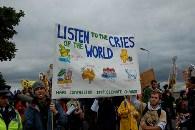 | « Back to article | Print this article |
From Copenhagen to Mexico: The cycle continues
 After failing at Copenhagen, we pinned our hopes on Mexico City; in Mexico, we'll look for some place else, writes Barun Roy.
After failing at Copenhagen, we pinned our hopes on Mexico City; in Mexico, we'll look for some place else, writes Barun Roy.
Full of sound and fury, signifying nothing. That's how the 2009 United Nations (UN) conference on climate change ended at Copenhagen, as it was expected to. There were the usual protests by activists and the usual arrests by the police, both sides pleased to have done their duties.
There were fiery speeches, righteous postures and indignant outpourings of blame. Then they all returned home, having cleaned their conscience, to wait till they meet again in Mexico City in 2010.
There were histrionics, too. The Maldivian Cabinet dived underwater to emphasise the island nations' fear of being drowned out of existence from rising sea levels. Ministers in Nepal gathered in the foothills of Mount Everest to express their panic over vanishing Himalayan glaciers.
Greenpeace took Earth on a funeral march through Bangalore. In Winnipeg, Canada, churchgoers rang hand bells, cowbells, jingle bells, and all kinds of other bells to warn people of the earth's impending death.
What have we got in the end? A limited, face-saving, non-binding "deal" brokered by the US. Essentially, a failure and a confusion of positions between the developed and developing worlds. So, we are off to Mexico now. In Mexico City, we'll look for some place else.
That's how the cycle goes, always rolling but never arriving, keeping the cause alive for all interest groups - the UN, the protesters, the goodwill ambassadors, the public-minded celebrities and the junket-happy politicians.
Amidst all this, the contradictions in the respective positions are happily overlooked. The developed nations won't agree to emission cuts unless the developing nations do so, too.
What does it mean? Go on adding to emissions and imperil your own future? The developing nations won't agree to cuts the West would like to impose. The argument is: Less emission means less development, and that's unacceptable. So what do we do? Sit pretty till we count ourselves developed and watch our own climate go from bad to worse in the meantime?
If the West's argument is unfair, the developing nations' is strange. They all know development is a polluter but won't act, on their own and to the extent they can, to make development less harmful in their own interest. They'll rather wait, accuse, and expect others to pay their laundry bills.
They feel no guilt, even though, potentially, they stand to lose more. The West has the economic strength to survive longest against calamities. The developing nations don't, and the climate has no reason to do them any special favours and wait to change till they first build up their guards.
One may go on arguing if cyclone Aila that ravaged the Sunderbans earlier this year was the result of environmental crimes committed by the US and other developed nations. But we could surely have reduced the severity of its impact and saved vast tracts of the delta from saline incursions had we protected, regenerated, and expanded its mangrove cover.
Myanmar, Vietnam and Bangladesh were among the countries worst affected by erratic weather conditions in 2008. Surely, they need outside help to cope with their crises, but isn't it their primary duty to act first in their own defence?
The developing nations' failure to own up their responsibility is the bigger cause for environmental worry, since these nations, seeking higher levels of development, are the biggest potential source of greenhouse gas (GHG) emissions.
By and large, the West is at a stage where it can't be any more dangerous than it already is. It's the developing nations that will suffer the most if they simply let their emissions compound the already high levels of the West's.
The poorer nations must develop, but with care. They should learn from the West's misdeeds. Destroying the environment can't be the only way to jack up the gross national product (GNP). There's no believable reason why these nations can't firmly declare their own green strategies and plan their development around them.
China has done so, offering to cut its carbon intensity emission per unit of GNP by 40-45 per cent by 2020 and committing upward of $400 billion in the next 11 years to climate-friendly development. Thus, it has acquired the moral authority to confront the West.
If India wishes to lead the environmental battle for the developing world, it must come out in the open with a clear outline of goals. But, maybe, for India, it's a little too late.
China is already hooked to clean technologies in a massive way, determined to explore new-age solutions to old-age problems. That's why it's able to promise deep cuts with such conviction.
One doesn't see similar boldness and race-against-time commitment in India's environmental planning. There's no courage. One hears a lot of talk, but the more we talk the more we fall behind, and the more it looks like New Delhi is going to lose another development frontier to Beijing.